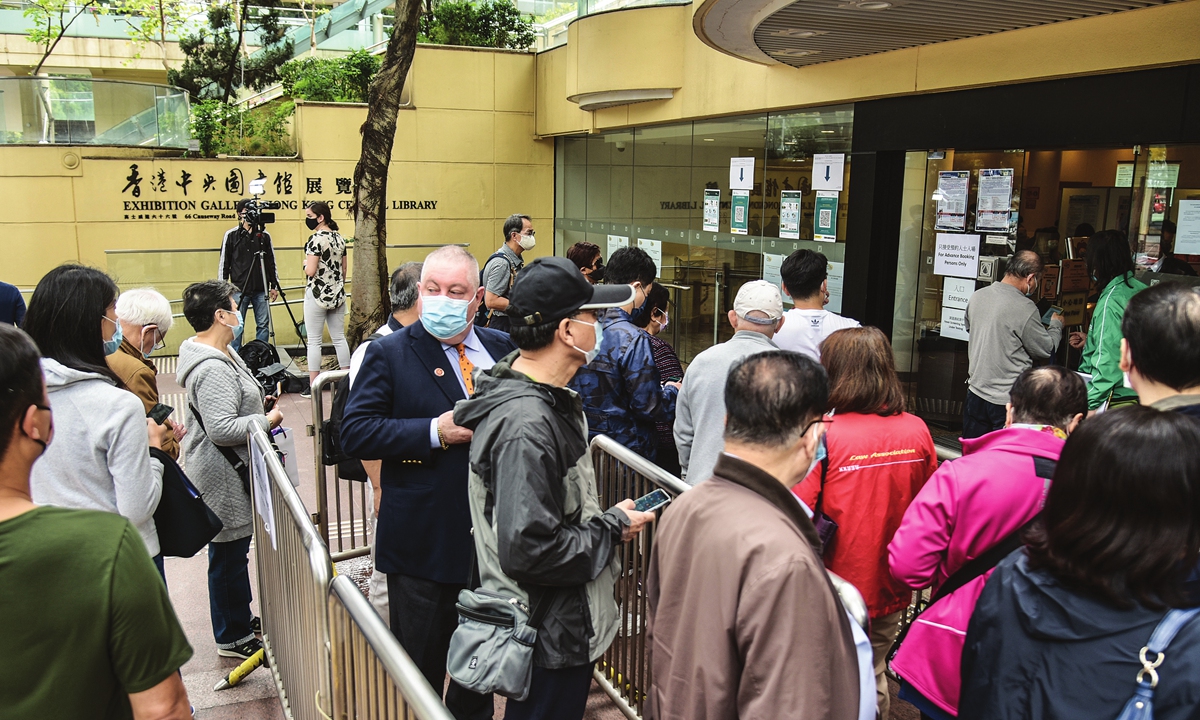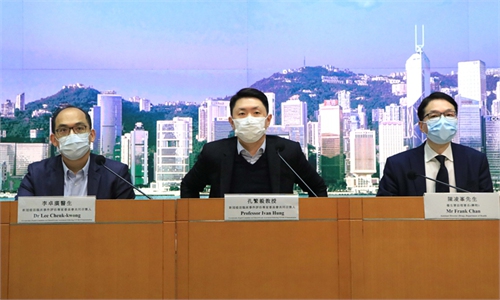HK to issue detailed COVID-19 vaccination guidelines as early as Friday following deaths

Residents wait to get vaccinated as the Hong Kong Special Administrative Region starts mass COVID-19 vaccination on Friday. The Hong Kong government has arranged five centers among residential communities and 18 general clinics to inoculate residents. Photo: cnsphoto
As soon as Friday, the Hong Kong regional government will issue detailed guidelines, including blood pressure and blood glucose readings, for doctors to decide whether a person can take COVID-19 vaccines, according to local media.
The move follows three deaths and some adverse reactions after injections that have triggered doubts over the city's priority policy to residents 60 years old and above, as the group faces chronic diseases.
According to Hong Kong experts, the first death following COVID-19 vaccination in Hong Kong, a man, 63, had a serious chronic disease, including "central obesity" - rounder stomach - and high blood pressure, and was suspected of having coronary heart disease. The second case, a woman, 55, died of a stroke and had an aortic laceration, and high blood pressure and high cholesterol.
Hong Kong authorities had said that they found no evidence to link the deaths to the vaccines.
Smokers, people with coronary heart disease, people with hypertension, diabetes and whose blood glucose level is over 10 will be recommended not to receive shots, Hong Kong media reported Thursday, citing Ivan Hung Fan-ngai, co-convenor of the Expert Committee on Clinical Events Assessment Following COVID-19 Immunization.
About 130,500 people in Hong Kong have been vaccinated against COVID-19, and seven people were sent to the hospital after receiving COVID-19 shots on Tuesday, with three over 60, the Hong Kong regional government said on Wednesday on its website.
Four of them developed symptoms of swollen throat, hypertension and chest arthralgia after being inoculated with Pfizer/BioNTech (Comirnaty) vaccine. Another three people who received the Sinovac vaccine had flushed face and swollen throat, local media reported citing the government. Hui Aimin, PhD, President of Global R&D and Chief Medical Officer of Fosun Pharma also told the Global Times that such "coincidental reaction" is almost certain to occur in any vaccination process, suggesting more cautions on inoculating fragile elderly, particularly people with underlying conditions.
The Hong Kong regional government's decision to include the elderly as a priority group for vaccination is a right path which should not be questioned, given the repeated outbreak within nursing homes in Hong Kong and high death rate among seniors in this pandemic, Jin Dongyan, a professor at the School of Biomedical Sciences at the University of Hong Kong, told the Global Times.
Even if elderly people do not receive a COVID-19 shot, other diseases and accidents could also cause deaths, Jin told the Global Times, calling the public to evaluate the deaths in Hong Kong rationally.
In Hong Kong, the mortality rate for those 60 years old and above was around 6.27 percent, which was almost 105 times those below 60 (0.06 percent) and all deaths from the third wave of COVID-19 in Hong Kong were 60 and above, a study by experts from The Chinese University of Hong Kong showed in August.
Jin and other experts reached by the Global Times suggested the SAR government release measures to encourage elderly to have health checks before receiving shots, or discourage those with underlying conditions to receive shots.
A Beijing-based vaccines expert told the Global Times on condition of anonymity that large-scale vaccinations on those 60 and above remain risky, especially mRNA-based COVID-19 vaccines. As the current COVID-19 vaccines are not the best products yet, strict caution should be taken with older people.


